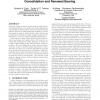Free Online Productivity Tools
i2Speak
i2Symbol
i2OCR
iTex2Img
iWeb2Print
iWeb2Shot
i2Type
iPdf2Split
iPdf2Merge
i2Bopomofo
i2Arabic
i2Style
i2Image
i2PDF
iLatex2Rtf
Sci2ools
125
click to vote
PVLDB
2010
2010
Distance-Based Outlier Detection: Consolidation and Renewed Bearing
Detecting outliers in data is an important problem with interesting applications in a myriad of domains ranging from data cleaning to financial fraud detection and from network intrusion detection to clinical diagnosis of diseases. Over the last decade of research, distance-based outlier detection algorithms have emerged as a viable, scalable, parameter-free alternative to the more traditional statistical approaches. In this paper we assess several distance-based outlier detection approaches and evaluate them. We begin by surveying and examining the design landscape of extant approaches, while identifying key design decisions of such approaches. We then implement an outlier detection framework and conduct a factorial design experiment to understand the pros and cons of various optimizations proposed by us as well as those proposed in the literature, both independently and in conjunction with one another, on a diverse set of real-life datasets. To the best of our knowledge this is the...
| Added | 30 Jan 2011 |
| Updated | 30 Jan 2011 |
| Type | Journal |
| Year | 2010 |
| Where | PVLDB |
| Authors | Gustavo Henrique Orair, Carlos Teixeira, Ye Wang, Wagner Meira Jr., Srinivasan Parthasarathy |
Comments (0)

